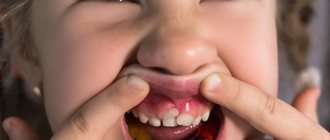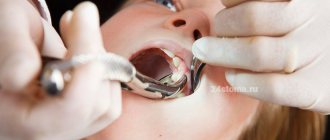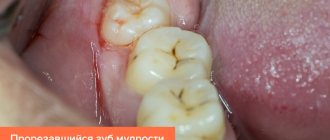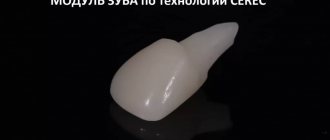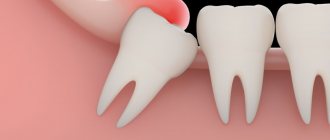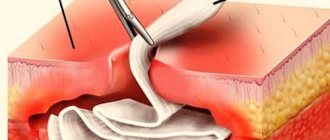Hello dear readers. There are cases when, after a child’s baby tooth falls out, a fairly noticeable molar appears, and sometimes it doesn’t hatch after a long time. And then the question arises, what to do if baby teeth fall out and new ones do not grow. In order to reassure your parents, it is better to immediately contact a doctor so that he can consider your specific case. However, there is no need to panic about this right away. In this article we will talk about the timing when molars should erupt, the possible reasons for their timely absence, and when a doctor’s help is required.
Content:
- Causes of the anomaly
- What does a “shark” smile lead to?
- When to see a doctor
- When to hesitate to see a doctor
- How is the treatment carried out?
The situation when a molar has erupted, but the milk tooth is in no hurry to leave its place, dentists call a “shark” bite. This is due to the fact that sharks also have units arranged in two rows. In humans, such an anomaly does not look aesthetically pleasing at all. Parents usually get very scared when they see a “double” smile on their child. Should I be concerned if a tooth comes out but the baby tooth does not fall out, and what could this lead to? Let's figure it out together.
Content
- How wisdom teeth erupt
- Causes of difficulties
- The danger of late eruption
- How can wisdom teeth erupt faster?
- Negative consequences of late eruption
- Ways to get rid of problems
- Medicines
- Home method
- Surgery
Wisdom teeth are rudiments, organs that have lost their significance. They are the last to be cut, pushing the neighboring ones along the way. It is often accompanied by pain, so you have to see a doctor.
Causes of the anomaly
If the permanent tooth is erupting but the baby tooth has not fallen out, it can be assumed that the child is not eating enough solid food. With a deficiency of chewing load, the roots of temporary units are in no hurry to dissolve.
The diet of modern children is indeed too “gentle”, one might even say refined. It consists of products that have undergone step-by-step heat treatment. Chewing them requires almost no effort.
If parents think that children need to be given soft and thoroughly steamed food, then they are mistaken. To change teeth in a timely manner and form a correct bite, you need to eat a lot of fresh vegetables and fruits, and other foods that require careful chewing. Then the problem of preserving primary canines, incisors and molars for too long will not arise.
Another possible cause of the problem described is the presence of scars on the gums. If in the first years of life the baby has undergone dental surgery or received a serious injury, a burn to the oral cavity, scars may form on his gums. They consist of very dense connective tissue that prevents teeth from erupting.
How wisdom teeth erupt
This process occurs starting from the age of 16 or at a later age. Dentists do not consider the eruption of these teeth to be a deviation even after 40 years.
Over the years, the jaws decrease in size, and there is no room left for the “eights”. If eruption is delayed, an x-ray should be taken to see the reason.
The path of this tooth passes through fairly thick soft tissue, so the following symptoms appear:
- Pain in the problem area or radiating to the jaw;
- Redness;
- Edema;
- Difficulty eating and opening the mouth.
Other manifestations are also possible:
- Second molars suffer from root or cervical caries;
- If the swelling is extensive, the throat and gums may hurt, causing odontogenic sore throat.
What does a “shark” smile lead to?
Should you be scared if a new unit comes out, but the milk unit does not fall out? This situation should alert parents. Double dentition can lead to problems with articulation and diction. Then the child will have difficulties with the correct pronunciation of sounds and words.
Also, many patients with the described anomaly have difficulty eating food - they feel uncomfortable biting off hard foods, and when chewing them, small particles often get lodged under the gum. This means that the child will get used to swallowing poorly chewed food. This leads to disturbances in the functioning of the gastrointestinal tract, including flatulence and abdominal pain.
It happens that children who have double units in several places at once begin to lose weight. This is again due to improper chewing of food. During a meal, they swallow large pieces and because of this they swallow a lot of air. Therefore, they often have the illusion of satiety - a feeling of fullness when very little has been eaten.
Among the dental complications caused by untimely change of units:
- caries;
- inflammation of the gums;
- deposition of a large amount of soft plaque.
Therefore, you should not put off visiting the dentist. The doctor will conduct an examination and decide whether to remove the extra unit.
Why do baby teeth deteriorate?
Damage to a baby tooth most often occurs due to caries in early childhood. This disease can take different forms. The wrong way to feed a baby can lead to bottle tooth decay. If the baby falls asleep with a bottle in his mouth or is given formula or sweet tea after waking up at night, then streptococcal bacteria develop in the mouth during sleep. They are the ones who contribute to the occurrence of this variant of the disease.
In older children, two and three years of age, circular caries is observed. This is the name of the early stage of caries with an acute course. It first begins to attack the front teeth, most often in the upper jaw and symmetrically on both sides, and then leads to pulp complications. A tooth with a damaged crown is not suitable for root canal treatment and must be removed. Leaving a baby tooth damaged by caries is dangerous because it is an inflammatory source in the child’s mouth.
Another very common cause of loss of baby teeth is childhood trauma. It is not uncommon for a child to lose teeth due to a fall. One of the main reasons is that the design of primary incisors is completely different from permanent incisors. They are smaller, have shorter roots, and the jaw bones are more spongy. Children of certain ages are at greater risk of injury:
- the first and second years of life are when they are just learning to walk, but the older the child, the greater the risk;
- later, at the age of four to six, other activities appear: playing with a ball, running, climbing.
So it is not difficult to lose a tooth. Often, the premature loss of baby teeth in children is not given much attention. However, the roots of an extracted baby tooth are usually not completely resorbed, and the root of a permanent tooth is still in the early stages of development. This has quite serious consequences, so the indications and contraindications for removal should not be ignored.
When to see a doctor
Doctors believe that a “shark” smile can last up to two to three months, then it is necessary to take action. If the baby tooth does not fall out within the specified period, it needs to be removed. If you do not do this, the complications described above may occur.
But what’s even worse is that the child’s bite may be disrupted. The permanent unit will take the wrong position or be at the wrong angle. Then you will have to correct its position using plates or braces, and this is always difficult and time-consuming.
It is important to know! If a permanent tooth has come out, but the baby tooth has not yet fallen out, you can monitor the situation for several weeks. It is important to ensure that the child carefully maintains oral hygiene. If after two or three months nothing has changed, you need to make an appointment for your baby to see a dentist. But this recommendation is relevant only if the little patient is not bothered by anything and does not complain of toothache.
Timing of eruption of molars
The rudiments of teeth begin to form already in the eighth week of intrauterine development; these are the future milk teeth. The rudiments of molars are at 20, their localization in the child’s jaw is much deeper. It is important that not all the teeth that the baby will erupt as he grows up will later fall out; some of them will immediately become permanent.
On average, a baby's first tooth appears at six months of age, and not later than three years - the child already has a mouth full of teeth.
Let's figure out when it's time for molars to erupt:
- At approximately seven years old, the baby will have molars, sixth teeth (in the dental formula), and from the ages of eleven to thirteen – seven teeth (also molars). It should be taken into account that such teeth do not have milk analogues; they simply erupt from scratch, immediately becoming permanent.
The remaining molars will be licked to replace the milk teeth.
- Between six and eight years of age, the central incisors should appear.
- From seven to nine - the lateral incisors will erupt.
- From ten to twelve years of age, the child will develop premolars (the fourth and fifth teeth on the dental formula).
- Between the ages of nine and thirteen, the molars will erupt.
And already in adulthood, wisdom teeth may appear, although not everyone has them, and this is not a particular problem.
Remember that these are only approximate dates and you should not immediately get upset if your child deviates from these indicators. And if you are very worried, it is better to see a dentist so that he can dispel all doubts.
When to hesitate to see a doctor
If a “shark” problem appears and the child complains of pain, the gums are inflamed, swollen, you need to immediately get dental care. Also warning symptoms are:
- bad breath;
- bleeding of the affected gums;
- separation of pus in the area of inflammation;
- severe discomfort while chewing food.
You should not wait a day if the child has a predisposition to malocclusion, for example, if he has previously undergone treatment for malocclusion or one of the parents wore braces. In all these situations, removal should be carried out as soon as possible. This measure will be a good prevention of possible complications.
What is the danger of late eruption?
There is a possibility of complications not only in the mouth, but also for the whole body:
- With prolonged accumulation of pus, which has no outlet, soft tissue melts, provoking the spread of infection and the formation of abscesses;
- The bite may be affected;
- If a tooth is cut towards the cheek, chronic injury occurs;
- Clamping of the mucous membrane with teeth leads to the appearance of a long-term non-healing wound and, as a result, ulcers;
- The temperature rises, weakness appears;
- Purulent inflammation eventually spreads to the periosteum.
The process is often aggravated by incorrect positioning or impaction of the tooth:
- Pericoronitis develops - the gingival hood becomes inflamed, as food accumulates in it and pathogenic bacteria multiply; in the absence of timely treatment, osteomyelitis and periostitis develop;
- A completely impacted tooth is the cause of neuralgia, facial pain, and cysts;
- With a horizontal direction of growth, the “figure eight” destroys neighboring teeth, causing caries;
- A wisdom tooth can begin to grow after the installation of a prosthesis, causing a lot of inconvenience to a person.
To prevent the development of complications, you should visit the dentist as soon as possible - the doctor will assess the situation and decide what to do.
How is the treatment carried out?
When choosing treatment tactics, the dentist takes into account:
- how old is the patient;
- how long ago the permanent unit emerged;
- how much the molar crown appeared;
- what condition is the milk unit in;
- does the child have any complaints;
- general condition of the dentition;
- the patient has a predisposition to dental anomalies.
After conducting an in-person examination, the dentist decides whether to pull out the interfering tooth or leave it and wait until its roots resolve on their own. In the first case, local anesthesia is administered and removal is carried out; in the second, the doctor tells you when the baby needs to come for a second examination. Thus, if you deal with the problem of a “shark” smile in a timely manner, it will not cause negative consequences.
Consequences of early destruction of primary teeth
After the early removal of a baby tooth, the gum in its place becomes overgrown, and the permanent one is deprived of its natural landmark. This leads to phenomena such as:
- dystopia - eruption of a permanent tooth outside the dental arch;
- retention - the occurrence of a formed tooth in the thickness of the jaw bone.
If the baby tooth does not receive treatment, and the inflammatory process spreads to its roots, then the permanent follicle located under them is damaged. In this case, the permanent one may die, and then its place in the dentition will remain empty. The absence of a tooth is confirmed by radiography.
How to help wisdom teeth erupt faster?
The eruption of figure eights is usually accompanied by pain.
Chewing solid food can make the process easier if it does not cause pain.
A soft and careful finger massage has a positive effect.
If your gums hurt and your temperature rises, you should consult a doctor who:
- Determine the cause of pain;
- Heals injured tissues;
- Will alleviate the patient's condition;
- Eliminates an unpleasant phenomenon.
